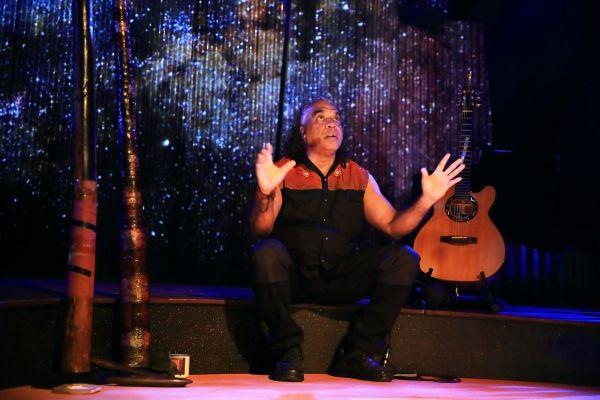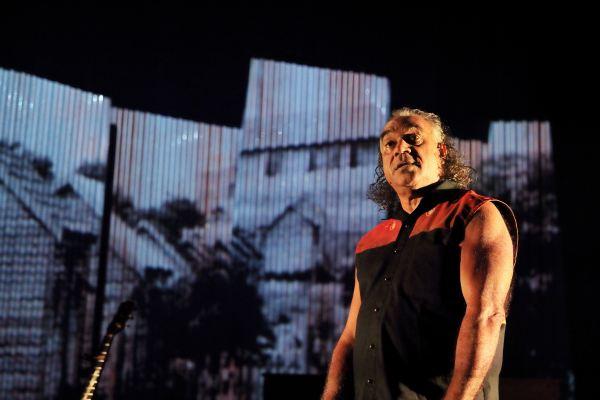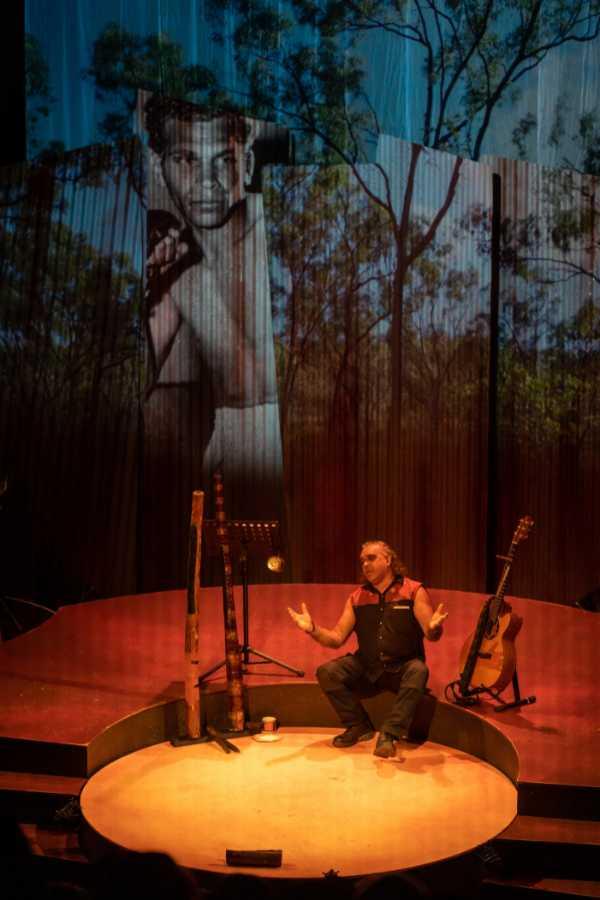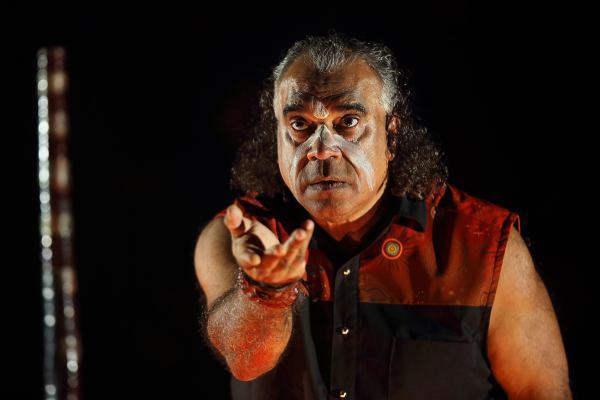'From Campfire To Stage Light' takes audiences on a culturally rich journey through the life experiences of cultural leader and Indigenous Australia ambassador David Bindi Hudson.
The play features music and lyrics from Nereace, Nigel Pegrum and David Bindi Hudson and is directed by nationally recognised First Nations Director Isaac Drandic.
It'll hit the Redland Performing Arts Centre (Queensland) stage with David Bindi Hudson at the centre – he's an internationally renowned storyteller, singer-songwriter, dancer, visual artist and actor, who brings a wealth of knowledge and appreciation for culture to everything he does.
'From Campfire To Stage Light' is a fusion of storytelling, songs, and visual design, presented by Didgeralia and JUTE Theatre Company.
These stories take audiences from traditional lands to mega stages, as David traversed the world musically to educate folks all around about his culture.
Here, David Bindi Hudson sits with us to chat about connection to culture, the inspirations behind the show, who the show is for, and more.
This is an epic journey toward self-determination and Indigenous pride. Tell us about ‘From Campfire To Stage Light’.
'From Campfire To Stage Light' is a personal journey grounded in my connection to culture and Country and my commitment to intergenerational knowledge sharing. I wanted to tell my story, my mother and father's stories. My grandmother came from the Palmer River in Western Yalanji country. When she was a kid, she was forcefully separated from her family, her brothers and sisters, and taken to Mona Mona mission north of Kuranda. My mother was born at Mona Mona. On my father’s side, the Hudson side, they are the Ewamian – Western Yalanji mob from way out west in the Gulf Savannah country. He, too, was brought to Mona Mona, and that’s how my parents met. The Mona Mona mission was run strictly by the Seventh Day Adventist Church, demanding a healthy, wholesome lifestyle. The old cultural ways weren’t encouraged and were almost stamped out of my mobs. Religious principles were drilled into those who were kept there. That place was also run like a prison camp. My mother managed to find a way out of Mona Mona and took her kids with her. She brought so much else with her – her religious beliefs, lifelong fears of being forced back to that place, and her determination that her children would grow up strong in culture. Even though I was born in Cairns, my mum took me out to live in my father’s Ewamian Country when I was just a kid. They taught me a lot, sitting around their campfires and hearing their stories. I cannot emphasise how much that impacted me because even though I was raised in my mother’s religious beliefs, that time spent with the Elders at Ewamian created a foundation of cultural knowledge, spirit and pride that has lasted a lifetime. Without that connection, that knowledge might have been lost to me forever. When I left school in Cairns in 1979, I needed to make music, tell stories, and talk about my culture. And I had itchy feet, you know. I headed out into the big wide world – first visiting Alice Springs – then west to Perth, and eventually, back home to Cairns and later – my first trip to America. Heading overseas was a major turning point, and I realised I could make a life out of performing. I’ve toured and performed in most of the world's major cities during my career and played on some of the world’s most famous stages, carrying my traditional and contemporary culture with me. So, this show is that journey from those precious campfires to the stage lights of the world.

Image © Frontrow Foto
What inspired you to create this show?
Telling my story and my family’s story. I have always wanted to tell my family stories, and I have done this through various mediums. I wanted to create a specific theatre piece, and between my company Didgeralia and JUTE Theatre Company, we collaborated on an original concept and script, which took shape over two years. First, I needed to develop a script. Enter JUTE’s award-winning playwright, Kathryn Ash, who worked with me to migrate the many stories I must tell into a cohesive theatrical piece. This process involved an intense period of unwrapping all my career memories and family stories about Mona Mona, then picking through these to curate the most impactful moments. My wife Cindy was also very involved in the writing process as she has been with me through almost everything since the day we met and is a huge part of my life. Kathryn then drafted the script, which underwent some more discussion and crafting between the three of us. The finished text is an authentic exploration of what it is to be me, David Hudson, having lived through the beginning of Aboriginal Australian self-determination and cultural pride. I want people, all people, to be able to connect with what that means and feel the incredibly positive energy of Aboriginal Australian culture.
What has been the biggest challenge in putting it all together?
Fitting the story of my life – until about 2003 – into an 85-minute play. Apart from that, getting the grants, writing, and developing the production from now – the whole project has been a challenge, but I have so many people who have helped and organisations like JUTE Theatre Company – I cannot thank them enough.
And how about the biggest reward?
It has been an enormous pleasure to share my culture on stage and have audiences realise that it is an open invitation to all Australians to connect with my culture. Presenting my play to my relatives in Cairns, many of whom are a strong part of who I am today, was also incredibly special. The play mentions many people, and it is an honour to recognise their presence in my life thus far.

Image © Frontrow Foto
Why do you think it’s important for people to see?
People need to learn more about First Nations culture and its complexities, but they should also appreciate that this ancient culture is still alive today. It is also poignant when I tell people that this show is powered by truth, the reality of our experience of being Aboriginal Australian. For example, I touch on my mum’s time on the mission. When she wanted to leave the mission, she had to apply for what was called ‘an exemption card’ granted through the Queensland Government. If you are younger than 40, perhaps you have never heard of such a thing. Without this card, Aboriginal people were forbidden to leave their mission. Once a person managed to get an exemption card, they needed to always carry it with them because they needed to prove to anyone who asked that they had permission to be off the mission. Things have changed, but the show discusses how they still need to change more. Healing needs to happen. Truth and trust need to be restored. People need to know the past, understand the present, and look forward together to the future.
Tell us more about the performance and what audiences can expect.
'From Campfire To Stage Light' is very funny and entertaining, as only I know how to be. It’s light-hearted in many ways, and the true Aboriginal sense of humour comes through. This show is not a ‘David Hudson concert’. It is a whole story, a one-man play with original music written in a collaborative process led by two Cairns musicians, Nigel Pegrum and Nereace Howes. These songs punctuate the special moments in the story, leave you smiling, and maybe sometimes bring a tear to your eye. Having ‘live’ musicians with me is the best – instead of backing tracks. Nigel and Nereace are a lot of fun and join in on the stage action. I have a nice little team with me. Then you have the set – which is unbelievable. My set is designed by award-winning set designer Josh Macintosh, and my daughter Jedess Hudson provides production art, including my deadly costume. The set is centred around a campfire – the perfect accompaniment to storytelling. Then there are the sheets of corrugated iron at the back – a nod to my background and the mission days – onto which some key images and video footage from my life are projected.
Who is ‘From Campfire To Stage Light’ for?
This is a show for everyone. Aboriginal people have been through some pretty hard times in the last two years and some major turndowns (the referendum, for instance), so we need to consider moving forward positively. If people come to my show, at least they can walk away from there with new hope and maybe a new mindset. This show gives people something to think about, and we can live together and move forward, and there is a chance to make it a better place.

Image © Frontrow Foto
If there were one thing you’d want to say to your childhood self, what would it be?
I would say to my childhood self that you are fortunate. You have your family, your culture, and your self-belief. Now, go out and see what life presents. You will have a good life if you are willing to back yourself and realise your potential. I have gone to college, travelled, and visited other countries and exposed myself to my culture. I am very fortunate. I had inspiring parents and a family who helped me believe in myself. When I left home in 1979 and ventured into the big wide world, my first stop was Alice Springs, where I met my girlfriend (now wife) Cindy and found my itchy feet. From there, I travelled to Perth, back to Cairns, and then to America. I have been able to follow my dreams and aspirations and be a voice for my culture and people. They are my big green ticks – I took my culture to the world – tick. I played music, another tick. I have accomplished all I want, but I will say that more change is needed. We must stop and learn from one another and others' mistakes – there is too much negativity in the world. C’mon folks, surely, we can set a better example for the next generation; otherwise, where will we be in 20 years?
What do you love most about First Nations culture?
I’m a proud Aussie, and I want people to understand that Australians have this old culture in our backyards that we can all benefit from in practical and spiritual ways. It has been my experience that Aboriginal culture is more appreciated overseas than in its own country. I want Australians to be prouder of First Nations history, to feel as if they can connect more with the ideas of the culture, and to find healing. All of us.

Image © Modfilms
What were you excited to include in this show, and why?
What comes to mind is the opportunity to share such an important part of Australia’s history that surrounds me, telling the story of my mum’s exemption card. To inform Australians about Aboriginal people raised on a mission. Until 1960, when the mission was eventually closed, Aboriginal people, like my mum, were forbidden to leave the mission if they didn’t have an exemption card. This is what it was like for my people. Mum carried her card even after walking off the mission. “I left it in my handbag because you just never know...” I was born in 1962, and while I am not that young, I am also not that old. From the time I was born until 1967, when Aboriginal people were allowed to vote, I was not a citizen of this country. It is 2024, and we have been through COVID-19, we have been through exemptions, and just by that very nature of border closures and lockdowns, the pandemic brought back many bad feelings for my mob. Another part of the show I have loved sharing is telling audiences about when my mum took me to my Elders out west on the cattle station – my father’s family who avoided the mission round-up. My Elders taught me my culture and many things, such as how to dance. I give thanks. These were important times for me.
'From Campfire To Stage Light' plays Redland Performing Arts Centre (Queensland) 13 July.

